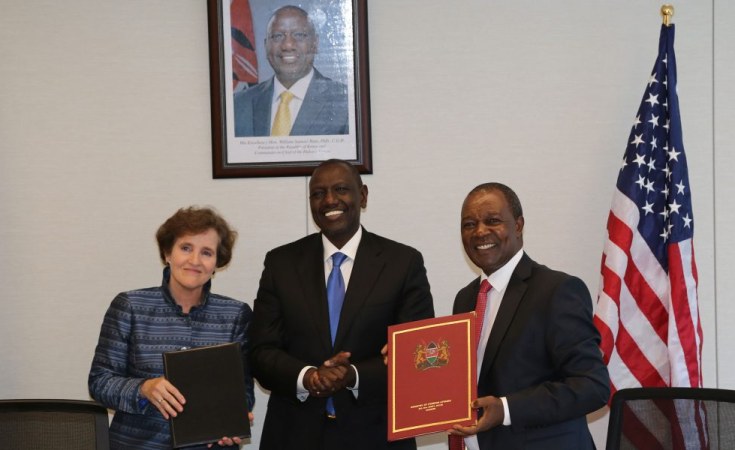Nairobi — Kenyan President William Ruto has signed a $60 million dollar grant agreement with the U.S. Millennium Challenge Corporation on the sidelines of the U.N. General Assembly session in New York. The grant will help improve urban transport in Nairobi by concentrating on four projects, making the Kenya program the largest of its kind within MCC's portfolio.
Kenyan President William Ruto lauded the new agreement with the U.S. foreign aid agency MCC, at the signing in New York City Tuesday evening where he is also attending the 78th session of this year's U.N. General Assembly.
"There is a whole one million people who come in and out of Nairobi every day; that poses a very significant challenge on the transport infrastructure. Apart from the Matatu transport system, the mass bus transport system is a very important component," he said.
Threshold grants help countries to reduce constraints to faster economic growth and increase transparency and accountability in the provision of public services.
Millennium Challenge Corporation CEO Alice Albright says this grant -- the second one to Kenya since 2003 -- will be the largest and most ambitious threshold agreement that MCC has signed in its 20-year history.
"We like to measure with all of our work, and in this case we estimate to about 4.3 million people could be helped by this threshold agreement," she said.
James Gerard, MCC's managing director for threshold programs, told VOA this program, which includes four projects, will help support the Kenyan government in improving transportation and land use planning in the capital, Nairobi.
"One, to help build the capacity of the Nairobi metropolitan area transport authority [NMATA] with their transportation planning needs," he said. "Second project will focus on what we call, non-motorized transport, so helping citizens -- particularly citizens of working class -- who use non-motorized transport as well as informal forms of transport, such as Matatus."
Matatus are privately owned public transport vehicles. Some are old and not in the best shape but often beautifully decorated with famous sayings and/or people. A vast majority of commuter trips in and out of Nairobi are taken using Matatus.
"The third project will focus on land use in and around certain areas of Nairobi trying to help urban planning around transportation hubs to better make use of that land. And finally, the fourth project is really to focus on helping finance future options around bus rapid transit in Nairobi and particularly looking at greener options to move citizens around the city perhaps using electric vehicles," said Gerard.
Korir Sing'Oei, Kenya's principal secretary for foreign affairs in the ministry of foreign and diaspora affairs, has been one of the lead negotiators for this grant. He told VOA it is exhilarating to finally get to this point.
"It's a moment of pride for Kenya because eligibility for MCC programs financing is predicated on democratic governance, economic freedom and investment in people that is evident in a particular country. So, to have Kenya be eligible for this program under MCC represents an acknowledgement on the part of the U.S. that Kenya sits in a very big space in relations to these issues," said Sing'Oei.
Additionally, he says this program will allow Kenya to build the necessary capacity to become eligible for a much bigger financing program under MCC known as the compact program, which could be worth around $800 million.


